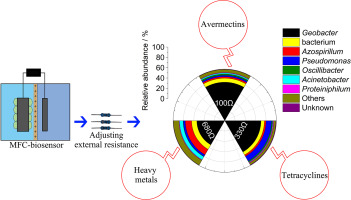Bioelectrochemistry ( IF 5 ) Pub Date : 2018-09-17 , DOI: 10.1016/j.bioelechem.2018.09.003 Yue Yi , Beizhen Xie , Ting Zhao , Zhaoming Li , Devard Stom , Hong Liu

|
The relatively poor sensitivity is the main bottleneck restricting the application of microbial fuel cell biosensor (MFC-biosensor) for toxicity monitoring. Previous studies have shown that external resistance (Rext) had an obvious effect on sensor sensitivity. However, these studies reported different results and the reason of this discrepancy was not clear. The objective of this research was to observe the effect of Rext on sensor sensitivity when detecting different types of pollutants and reveal its microbiological mechanism. Results demonstrated that the optimal Rext of MFC-biosensor varied with the type of pollutants. The optimal values for detecting avermectins, tetracyclines and heavy metals were 100 Ω, 330 Ω and 680 Ω, respectively. This discrepancy was mainly due to the visible differences in anodic microbial communities at different Rext settings. Both Azospirillum and Acinetobacter were susceptible to Cd and Pb, occuping 19.20% of the anodic microbial population in 680 Ω MFC-biosensor. Pseudomonas accounted for 10.73% in 330 Ω MFC-biosensor and possessed the sensitivity to tetracyclines. As for 100 Ω MFC-biosensor, the avermectin-intolerant Ocillibacter made up 2.55% of the anodic microbial community. This study indicated that the Rext of MFC-biosensor should be optimized according to the potential pollutants.
中文翻译:

外电阻对微生物燃料电池生物传感器检测不同类型污染物敏感性的影响
相对较差的灵敏度是限制微生物燃料电池生物传感器(MFC-biosensor)用于毒性监测的主要瓶颈。先前的研究表明,外部电阻(R ext)对传感器的灵敏度有明显的影响。但是,这些研究报告了不同的结果,这种差异的原因尚不清楚。这项研究的目的是在检测不同类型的污染物时观察R ext对传感器灵敏度的影响,并揭示其微生物学机理。结果表明,最佳R extMFC-生物传感器的类型随污染物的类型而变化。检测阿维菌素,四环素和重金属的最佳值分别为100Ω,330Ω和680Ω。这种差异主要是由于在不同的R ext设置下,阳极微生物群落的可见差异。在680ΩMFC生物传感器中,固氮螺菌和不动杆菌均对Cd和Pb敏感,占阳极微生物种群的19.20%。假单胞菌在330ΩMFC生物传感器中占10.73%,对四环素具有敏感性。对于100ΩMFC生物传感器,不耐受阿维菌素的Ocillibacter占阳极微生物群落的2.55%。这项研究表明,R ext MFC-biosensor的传感器应根据潜在污染物进行优化。



























 京公网安备 11010802027423号
京公网安备 11010802027423号